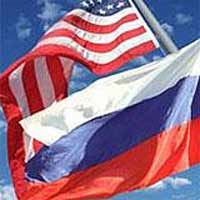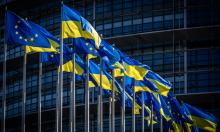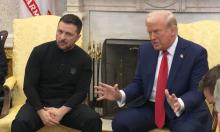Russia and US Will Not Lecture Each Other
The meeting of the US-Russian workgroup for the civil society, established upon the initiative of the presidents of the two countries will take place in Washington next week. First deputy chairman of the administration of the Russian president, Vladislav Surkov, the head of the Russian side in the committee, gave an exclusive interview to Russia’s Izvestia newspaper prior to his departure to the United States.

Q: A lot has been said recently about a new working group on civil society set up as part of a new U.S.-Russian Bilateral Presidential Commission. As a chairman of the Russian side in the group, can you please tell us about the plans for the future?
A: The workgroup will gather for its first meeting in the USA, Washington on January 27. The United States suggested only state officials be included in the group as its members. We didn’t mind. We offered to include such Russian officials as Vladimir Lukin, the Human Rights Commissioner of Russia, Ella Pamfilova, the chairwoman of the Civil Society Institution and Human Rights Council of the Russian Federation, Pavel Astakhov, the presidential aide for children’s rights, Alina Radchenko, a senior official with the Public Chamber of the Russian Federation, and other personas. They have a special status – they are not quite officials. There are no such positions in the United States, that is why we included them in the Russian delegation in the group.
Q: Has the agenda of the group been coordinated?
A: The agenda includes the following issues: the struggle against corruption, migration, the issue of illegal migration, first and foremost, the condition of prisoners and the struggle against crimes committed against children. These are the issues that the Russian side proposed. The American side proposed the issues of negative stereotypes and myths that can be found in our relations. We tried not to touch upon the issues that we will hardly be able to agree on. We will be approaching them gradually, as our mutual understanding improves.
In Washington, we will only discuss the anti-corruption struggle, crimes against children and negative stereotypes.
Q: Which were the criteria for the Russian side to pick the priorities?
A: There is statistic information on all of the approved issues. More importantly – all of them are actual for both Russia and the USA. We have something to say to each other.
Let’s take the problem of corruption, for instance. This phenomenon has different origins in our countries, of course. Nevertheless, large corruption scandals may occur both in Russia and in the USA.
Migration is another issue. Russia and the USA are world leaders in terms of both legal and illegal migration. This problem is also relevant for both countries . The same can be said about the third problem – the condition of prison inmates. Our countries also take sad leadership on the number of imprisoned people.
Crimes against children is an extremely important issue. The number of crimes committed against underage individuals in Russia has had a tenfold increase during the recent years. America has an extensive experience of struggle against this evil. It will be good for us to get acquainted with that experience since Russia has to do a lot at this point.
Q: Several children, whom US family couples adopted from Russia, died in the United States. Will Russia raise this subject ?
A: I’d like to emphasize that we will not point that out to each other at the meeting, what needs or does not need to be done. We will not lecture anyone – this is not the goal of our work. We know that the USA is concerned about this problem, and there are efforts being taken to solve it.
Q: Some human rights activists in Russia and congressmen in the United States have recently criticized you. What can you say about that?
A: There was some roughness during the work to prepare for the meeting of the workgroup. We exchange information with our American colleagues. As for criticism, I would say that everyone is entitled to their opinion. I think that it’s a small part of a whole complex of prejudices and negative stereotypes. We will probably be able to get rid of them during our cooperation.
Q: Is it necessary to develop the activities of the workgroup in the future?
A: We would like to see next meetings of the workgroup taking place in other places, not just in the capitals of Russia and the USA. We are going to hold meetings both in American states and in Russian regions. The group must not turn into a committee that sits in Moscow or Washington offices and talks about something in an abstract way.
Q: The USA will reportedly raise the question of equal cooperation between non-governmental organizations from Russia and the USA. Is there any inequity in rights between the organizations from the two countries?
A: We do not see any inequity between Russian and American organizations, nor do we see any obstacles for dialogue between them, taking into consideration the fact that the US government funds many Russian NGOs.
As for prejudices and roughness:
Russian news agencies reported that official spokespeople for the US side of the McFaul-Surkov committee had sent invitations to a number of Russian NGOs to participate in the meeting of the committee on January 27 in Washington.
A high-ranking source at Russia’s Foreign Affairs Ministry said that the Russian side in the committee said that such actions came in contrast to the format of the workgroup. US officials apologized to their Russian colleagues afterwards. This is probably what Mr. Surkov referred to as “roughness.”
Scientist of politics Dmitry Orlov said that US officials may often try to obtrude their approach within the framework of bilateral relations.
“They try to act within the scope of stereotypes, against which they offer to struggle together. However, their apologies, as I believe, testify to the attempt to build constructive cooperation in the McFaul-Surkov group,” he said.
Izvestia
Subscribe to Pravda.Ru Telegram channel, Facebook, RSS!





